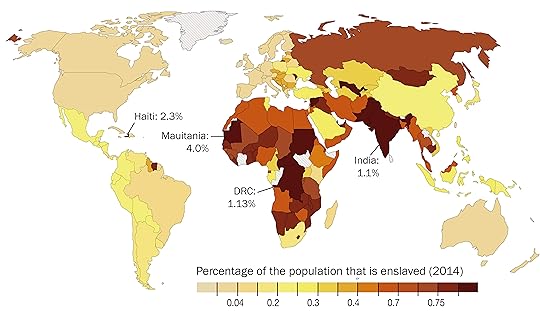Slavery Is Still With Us, Ctd

Rick Noack discusses the above map, indicating the portion of the global population currently enslaved, as per a recent report:
About 60,000 people suffer under modern-day slavery in the United States. According to the authors of the report, in the U.S. “men, women and children are exploited as forced laborers, and in the commercial sex industry — In 2013, potential modern slavery cases were reported in fifty states.” The report explains that slaves are forced to perform domestic work and home healthcare, they work in the food industry, as well as in construction, agriculture, nursing, factories and garment-manufacturing, among other sectors.
Neighboring Mexico struggles with about 270,000 slaves, and Japan surprises with a staggering 240,000 enslaved people — a number that is the highest in any developed country. Japan is primarily confronted with sex slavery, a problem which has not been tackled seriously enough in the past by the country’s government, as rights groups have repeatedly criticized.
Larry Elliott comments on the findings as they relate to Britain:
Modern slavery is a live political issue in the UK, with a bill on the issue moving through parliament and David Cameron highlighting it in his speech to the Conservative party conference this year.
“But there’s still more injustice when it comes to work, and it’s even more shocking. Criminal gangs trafficking people halfway around the world and making them work in the most disgusting conditions,” Cameron said. “I’ve been to see these houses on terraced streets built for families of four, cramming in 15 people like animals. To those crime lords who think they can get away with it, I say ‘no, not in this country, not with this party’
And The Economist hones in on Mauritania:
Biram Dah Abeid…, a self-proclaimed descendant of slaves who was runner-up in Mauritania’s presidential election in June, albeit with only 9% of votes to the incumbent’s 82%, was detained along with a clutch of fellow members of his Initiative for the Resurgence of the Abolitionist Movement.
On paper, Mauritania abolished slavery in 1981, though without passing legislation to punish slave-owners. In 2007 it made slave-owners liable to prosecution. But Mr Abeid, who says that half of Mauritania’s population are descendants of slaves (or are still slaves), insists that the law continues to be flouted. Amnesty International, among other advocacy groups, has protested against his recent arrest. The Walk Free Foundation, an Australia-based lobby that published its latest global slavery index on November 18th, reckons that around 150,000 people out of Mauritania’s total population of 3.8m are still enslaved.
Previous Dish on modern-day slavery here.









Andrew Sullivan's Blog
- Andrew Sullivan's profile
- 153 followers



